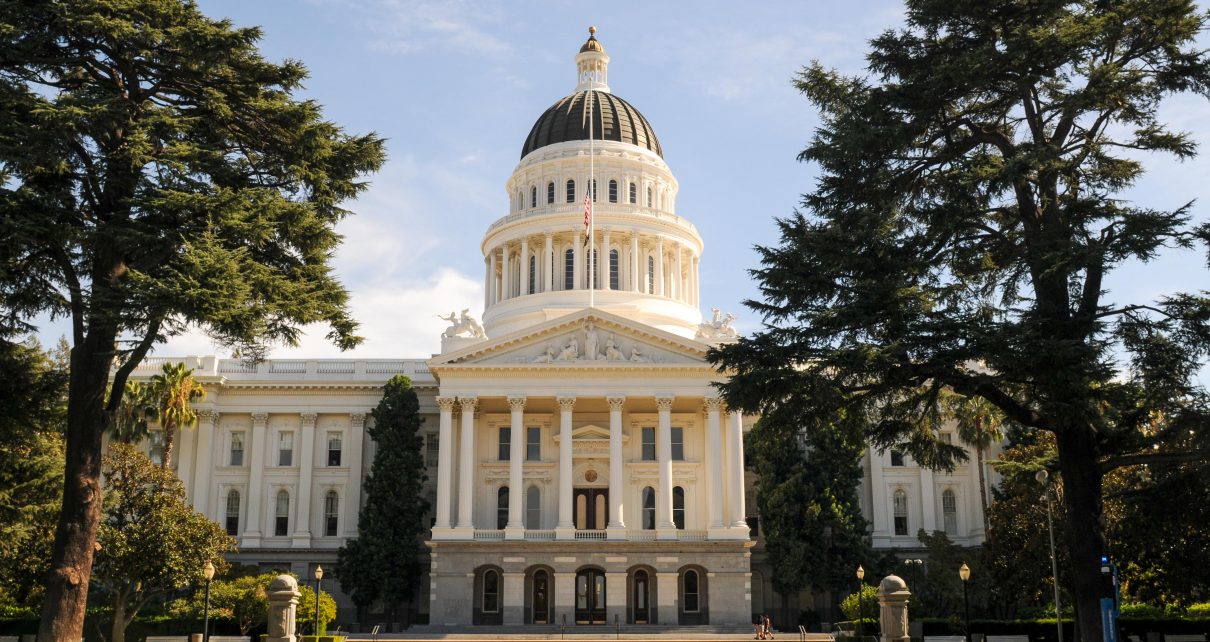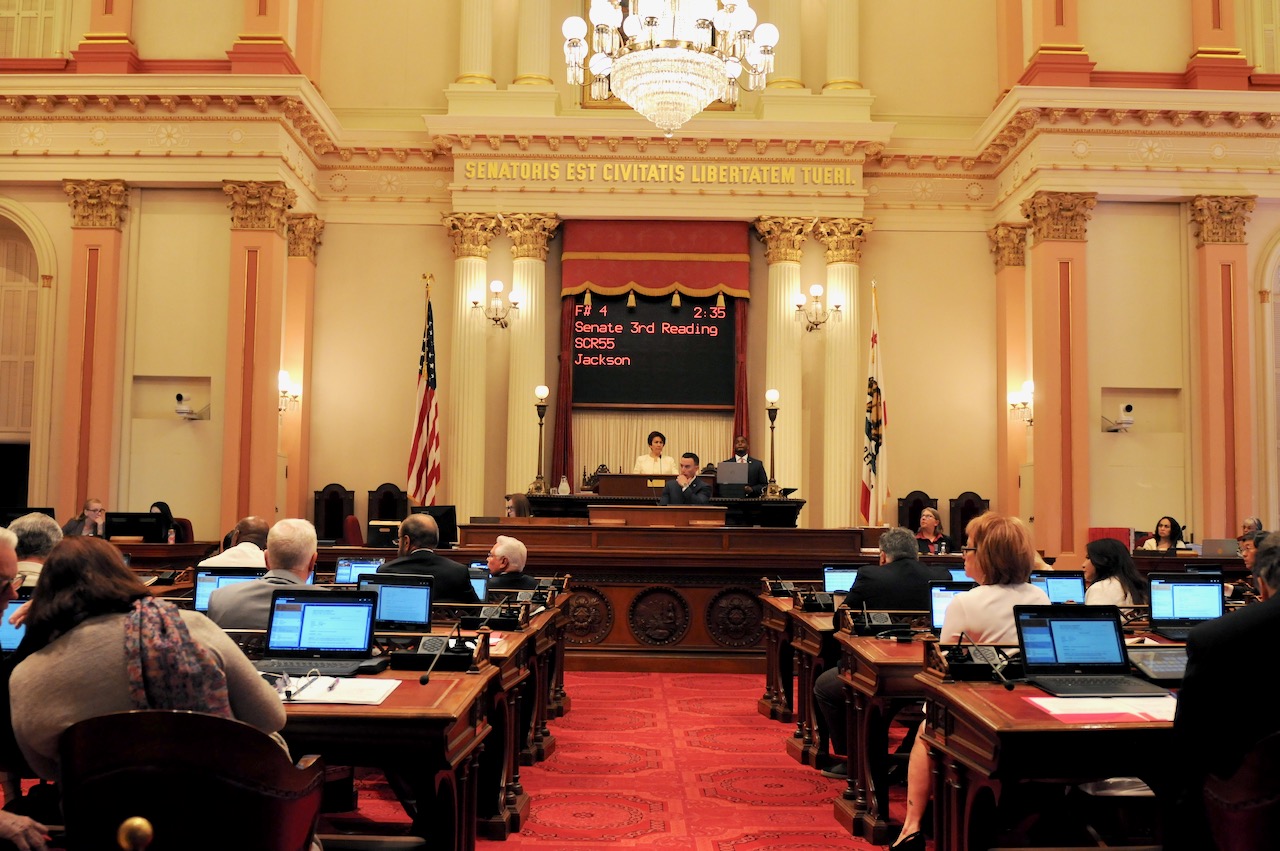
California State Capitol. (Photo: Kevin Sanders for California Globe)
PAGA Reform Legislation Unveiled
Private Attorneys General Act bills must both be enacted for them to be effective
By Chris Micheli, June 21, 2024 10:00 pm
On June 18, 2024 Governor Gavin Newsom, Assembly Speaker Robert Rivas, and Senate President pro Tempore Mike McGuire announced a legislative compromise to make changes to California’s Private Attorneys General Act (PAGA) statute, contained in Labor Code Sections 2699, et seq. The PAGA reform package is contained in two bills, one by the Assembly Judiciary Committee Chair and the other by the Senate Judiciary Committee Chair. In addition, 28 Assembly Members and 19 Senators are co-authors of the two measures.
Both bills became public in the late afternoon on Friday, June 21. Both bills contain urgency clauses, so they will take effect immediately once signed by Governor Newsom, which is expected on Thursday, June 27. However, the bills provide that their provisions will apply to any civil action brought on or after June 19, 2024. Finally, the bills must both be enacted for them to be effective. The following is a review of the provisions in the respective bills:
AB 2288 (Kalra)
This bill amends Section 2699 of the Labor Code. Section 1 of the bill contains the following changes in one of the PAGA statutes:
- A civil action may be brought by an aggrieved employee on behalf of the employee and other current or former employees, so long as they suffered the same violation of the Labor Code (“against whom a violation of the same provision was committed”).
- The definition of “aggrieved employee” was changed to require that the employee “personally suffered each of the violation alleged during the period prescribed pursuant to CCP Section 340.
- There is an exception for a tax-exempt, nonprofit legal aid organization that is a qualified legal services project or qualified support center under B&P Code Section 6213 and has been legal counsel for the last five years to file a civil action on behalf of an employee and current or former employees
- The current definition of “cure” is repealed with a definition provided. With specified exceptions, “cure means that the employer corrects the violation alleged by the aggrieved employee, is in compliance with the underlying statutes specified in the notice required by this part, and each aggrieved employee is made whole.”
- Making an employee “whole” means receiving any owed, unpaid wages for the prior 3 years, plus 7% interest, and attorneys’ fees.
- In order to cure a violation, there must be a showing that the employer provided written notice of the correct information to each aggrieved employee. For paystub violations under LC Section 226, in order to cure a violation, there must be a showing of “a fully compliant, itemized wage statement or, if such information is customarily provided in digital form, reasonable access to a digital or computer-generated record or records maintained in the ordinary course of business containing the same information required on a fully compliant, itemized wage statement, to each aggrieved employee for each pay period during which the violation occurred during the three years prior to the date of the notice.”
- The Labor and Workforce Development Agency has discretion to assess a civil penalty of seek injunctive relief.
- A court may award a lesser amount than the maximum civil penalty amount or an amount that exceeds the limitation based upon the facts and circumstances of a particular case.
- The current civil penalty of $100 per pay period for the initial violation and $200 for each subsequent violation is repealed.
- There will be a $100 civil penalty for each aggrieved employee per pay period, with exceptions.
- If it is a LC Section 226 paystub violation, the only civil penalty is $25 for each aggrieved employee per pay period if the employee could promptly and easily determine from the wage statement alone the accurate information required. This does not apply with a failure to provide an itemized payroll statement.
- There will be a $50 civil penalty for each aggrieved employee per pay period if the alleged violation resulted from an isolated, nonrecurring event that did not extend beyond the lessor 30 consecutive days or four consecutive pay periods.
- There will be a $200 civil penalty for each aggrieved employee per pay period if either apply: “Within the five years preceding the alleged violation, the agency or any court issued a finding or determination to the employer that its policy or practice giving rise to the violation was unlawful. The court determines that the employer’s conduct giving rise to the violation was malicious, fraudulent, or oppressive.”
- If, prior to receiving a notice of violation, or prior to a request for records, if the alleged violator has taken all reasonable steps to be in compliance with all notice provisions, the civil penalty is no more than 15% of the previously-identified civil penalties.
- The term “all reasonable steps” is defined to include any of the following: “conducted periodic payroll audits and took action in response to the results of the audit, disseminated lawful written policies, trained supervisors on applicable Labor Code and wage order compliance, or took appropriate corrective action with regard to supervisors. Whether the employer’s conduct was reasonable shall be evaluated by the totality of the circumstances and take into consideration the size and resources available to the employer, and the nature, severity and duration of the alleged violations. The existence of a violation, despite the steps taken, is insufficient to establish that an employer failed to take all reasonable steps.”
- If, within 60 days after receiving the notice of alleged violation, the alleged violator has taken all reasonable steps to prospectively be in compliance with all provisions identified in the notice, the civil penalty is no more than 30% of the previously-identified civil penalties.
- An aggrieved employee cannot collect a civil penalty for violations of LC Code Section 201, 202, 203, or 204 if it is neither willful nor intentional, or a violation of LC Section 226 that is neither knowing nor intentional, nor a failure to provide a wage statement.
- When an employer satisfies specified requirements and cures a violation, the employer is not required to pay a civil penalty for that violation. In other instances, the employer must pay a civil penalty of no more than $15 per employee per pay period for the statute of limitations under CCP Section 340 for any violations the employer cured.
- Civil penalties recovered by an aggrieved employee is to be distributed 65% (rather than the current 75%) to the Labor and Workforce Development Agency for enforcing labor laws and 35% (rather than the current 25%) to the aggrieved employee.
- The civil penalty is reduced by one-half (1/2) if the employee’s regular pay period is weekly instead of biweekly or semimonthly.
- A superior court may limit the evidence to be presented at trial or otherwise limit the scope of any claim filed in order to ensure that the claim can be effectively tried.
- A court is not prohibited from consolidating or coordinating civil actions filed pursuant to this part alleging legally or factually overlapping violations against the same employer.
- The amendments to Section 2699 of the Labor Code apply to a civil action brought on or after June 19, 2024.
- The amendments to Section 2699 do not apply to a civil action for which the required notice was filed before June 19, 2024.
Section 2 of the bill contains contingent enactment language that AB 2688 will be operative only if SB 92 is also enacted and takes effect. Section 3 of the bill contains urgency clause language that the bill must take effect immediately “in order to further the purpose and intent of the Labor Code Private Attorneys General Act of 2004 to protect workers from labor violations and address a pending ballot measure, it is necessary for this statute to take effect immediately.”
SB 92 (Umberg)
This bill amends Labor Code Section 2699.5, as well as amends, repeals, and adds Section 2699.3 of the Labor Code.
Section 1 of the bill amends Labor Code Section 2699.3, but those provisions are only in effect until October 1, 2024, and then are repealed. In addition, the amendments to Section 2699.3 apply to a civil action brought on or after June 19, 2024, but not to a civil action for which the required notice was filed before June 19, 2024.
Section 2 of the bill adds Section 2699.3 to the Labor Code effective October 1, 2024. It contains the following changes in one of the PAGA statutes:
- A civil action by an aggrieved employee can commence only after the following requirements are met: (1) The aggrieved employee or representative gives written notice by online filing with the Labor and Workforce Development Agency and by certified mail to the employer of the specific provisions of the Labor Code alleged to have been violated, including the facts and theories to support the alleged violation. (2) A notice filed with the Labor and Workforce Development Agency and any employer response to that notice must be accompanied by a filing fee $75, which is paid to the LWD Fund and used for specified purposes.
- The LWDA must notify the employer and the aggrieved employee or representative by certified mail that it does not intend to investigate the alleged violation within 60 calendar days of the postmark date of the notice received. Thereafter, the aggrieved employee may commence a civil action pursuant to Section 2699.
- If LWDA intends to investigate the alleged violation, then LWDA must notify the employer and the aggrieved employee or representative by certified mail of its decision within 65 calendar days of the postmark date of the notice. And, within 120 calendar days of that decision, LWDA may investigate the alleged violation and issue any appropriate citation.
- If LWDA determines that no citation will be issued, then LWDA must notify the employer and aggrieved employee of that decision within 5 business days by certified mail. Thereafter, the aggrieved employee may commence a civil action.
- A plaintiff may amend an existing complaint to add a cause of action arising under PAGA at any time within 60 days of the time periods specified.
- A civil action by an aggrieved employee, except for alleged violations listed in Section 2699.5, can only commence after the following requirements have been met: (1) The aggrieved employee or representative gives notice by online filing with the Division of Occupational Safety and Health and by certified mail to the employer, including the facts and theories to support the alleged violation. (2) DOSH must inspect or investigate the alleged violation.
- If DOSH issues a citation, the employee may not commence an action under PAGA. DOSH must notify the aggrieved employee and employer in writing within 14 calendar days of certifying that the employer has corrected the violation.
- An employee cannot file a notice or to commence a civil action under PAGA during the period that an employer has voluntarily entered into consultation with DOSH to ameliorate a condition in that particular worksite.
- A superior court must review and approve any proposed settlement of alleged violations of the provisions to ensure that the settlement provisions are at least as effective as the protections or remedies provided by state and federal law or regulation for the alleged violation.
- A civil action by an aggrieved employee alleging a violation of any provision other than those listed in Section 2699.5 or Division 5 of the H&S Code can commence only after the following requirements have been met: (1) The aggrieved employee or representative gives written notice by online filing with LWDA and by certified mail to the employer of the specific provisions of the Labor Code alleged to have been violated, including the facts and theories to support the alleged violation. (2) A notice filed with LWDA and any employer response to that notice requires a $75 filing fee, which is paid to LWD Fund. If LWDA notifies that it does not intend to investigate the alleged violation within 60 calendar days of the postmark date of the notice received, then the aggrieved employee may commence a civil action.
- If LWDA intends to investigate the alleged violation, LWDA must notify the employer and the aggrieved employee or representative by certified mail of its decision within 65 calendar days of the postmark date of the notice received. And, within 120 calendar days of that decision, LWDA may investigate the alleged violation and issue any appropriate citation.
- Within 33 days of receipt of the notice sent by the aggrieved employee or representative, an employer that employed fewer than 100 employees in total during the period covered by the notice may submit to LWDA a confidential proposal to cure one or more of the alleged violations. The employer is required to specify which of the alleged violations it proposes to cure.
- If the cure is facially sufficient or if a conference is necessary to determine if a sufficient cure is possible, then within 14 days after receipt of the employer’s proposal, LWDA may set a conference with the parties, to be conducted no more than 30 days thereafter, to determine whether the proposed cure is sufficient, what additional information may be necessary to evaluate the sufficiency of the cure, and the deadline agreed upon by the parties for the employer to complete the cure.
- If the cure includes the payment of unpaid wages, then LWDA must also determine at the conference whether to request the employer pay the proposed cure amount, including any wages and liquidated damages due and 7% interest, into escrow or provide another form of security.
- If LWDA determines that the cure is not facially sufficient or does not act upon the employer’s cure proposal, the employee may proceed with a civil action under PAGA after 65 calendar days from sending the notice required, unless extended by LWDA not more than 55 more days.
- On or before the agreed upon deadline to cure, but no more than 45 days after the conference, the employer is required to complete the cure and provide a sworn notification to the employee and LWDA that the cure is completed, accompanied by a payroll audit and check register if the violation involves a payment obligation. LWDA must verify whether the cure is complete within 20 days of receiving the employer’s notification.
- No cure or proposal to cure may be deemed an admission of liability by the employer that submitted the proposed cure. Any cure proposal is a confidential settlement proposal subject to Evidence Code Section 1152.
- If the only alleged violation the employer seeks to cure is a violation of Labor Code Section 226 (paystub), then specified procedures apply.
- Specified employers may file a request for an early evaluation conference in the proceedings of the claim and a request for a stay of court proceedings prior to or simultaneous with that defendant’s responsive pleading or other initial appearance in the action that includes the claim. The purpose of this evaluation conference must include the evaluation of four specified items.
- A court is required to stay the proceedings and issue an order that requires five specified actions.
- If the neutral evaluator accepts the employer’s proposed plan for curing any or all alleged violations, the defendant must then present evidence within 10 calendar days demonstrating that the cure has been accomplished. If the employer fails to cure, then the early evaluation process and any stay may be terminated by the court.
- In calculating any penalties owed for any violations that the employer promptly cured, the court is required to consider that the violations were cured without the need for extended litigation The early evaluation process does not extend beyond 30 days unless parties mutually agree to extend time.
- The early evaluation conferences are to be conducted by a judge or commissioner or other person knowledgeable about and experienced with issues arising under the Labor Code whom the court designates.
- This section becomes operative on October 1, 2024.
Section 3 of the bill amends Labor Code Section 2699.5 to repeal certain Labor Code sections including Sections 226, 226.7, 227, 227.3, 510, 512, 513, 1194, 1197, 1197.1, 2800, and 2802. The amendments made to this section apply to a civil action brought on or after June 19, 2024, but does not apply to a civil action for which the required notice was filed before June 19, 2024.
Section 4 of the bill includes findings and declarations regarding the need to impose a limitation on the public’s right of access to meetings and writings of public bodies and officials.
Section 5 of the bill specifies that no state reimbursement is required for any costs incurred by a local agency or school district.
Section 6 of the bill Section 2 of the bill contains contingent enactment language that SB 92 will be operative only if AB 2288 is also enacted and takes effect. Section 7 of the bill contains urgency clause language that the bill must take effect immediately “in order to further the purpose and intent of the Labor Code Private Attorneys General Act of 2004 to protect workers from labor violations and address a pending ballot measure, it is necessary for this statute to take effect immediately.”
- Specialized Areas of Lobbying - February 1, 2026
- Partition of Property by Appraisal - February 1, 2026
- Limits on Power in Eminent Domain - January 31, 2026




